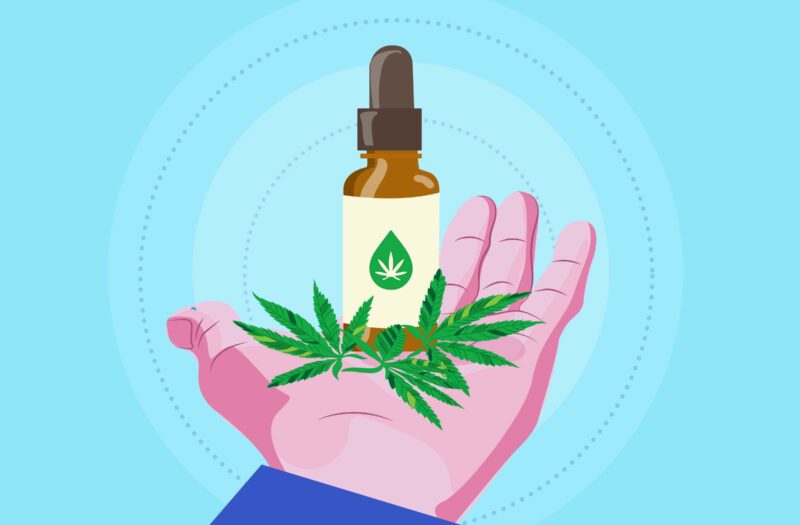Key Takeaways
- Most CBD products haven’t been proven safe or effective.
- The FDA says these products aren’t considered drugs or supplements.
- A new regulatory pathway to evaluate them will be developed.
A wide array of products containing cannabidiol (CBD) have flooded the market in recent years, yet whether most are being sold legally is a bit unclear. While many states have passed laws that make it possible to sell cannabis products (including for medical use), the U.S. Food and Drug Administration (FDA) hasn’t actually approved any CBD drug products other than Epidiolex, a prescription-only drug used to treat seizures.
Although most CBD creams, pills, and tinctures sold in stores and online don’t quite qualify as “drugs” per the FDA’s official definition, the agency says that they aren’t exactly “supplements,” either. This applies even if they are THC-free (tetrahydrocannabinol is the psychoactive component of cannabis) or derived from hemp. As a result, they’re not being properly vetted under any current FDA pathway. The solution: Create a brand-new one.
Typically, manufactures seeking to bring a new drug to market must go through a very specific process to demonstrate its safety and effectiveness. On the other hand, dietary supplements are not subject to this level of scrutiny. The FDA lacks the authority to approve supplements or their labeling before they are sold. Instead, the agency simply reviews product labels, occasionally inspects manufacturing facilities, and assesses adverse event reports. If necessary, the FDA takes action to improve the product or take it off the market.
In January 2023, the FDA announced that it had formed a “high-level internal working group” to explore how to best evaluate CBD products. They concluded that neither the drug approval process nor the supplement regulations were suitable. The FDA determined the need to establish a new regulatory pathway that balances the public’s desire for CBD access with necessary oversight to manage risks. Simultaneously, the FDA rejected three petitions seeking to market CBD as dietary supplements.
According to Dr. Janet Woodcock, Principal Deputy Commissioner of the FDA, the working group she chairs has thoroughly examined various studies and scientific literature related to CBD-based drug Epidiolex. They also reviewed information from public dockets and studies conducted or commissioned by the agency. “Given the available evidence, it is not apparent how CBD products could meet safety standards for dietary supplements or food additives,” said Woodcock in a statement. “For example, we have not found adequate evidence to determine how much CBD can be consumed, and for how long, before causing harm.”
While many people assume that CBD products without THC are completely harmless, the FDA highlights some potential risks. CBD has the potential to cause liver injury, interact with alcohol or medications, and may lead to drowsiness, digestive issues, or irritability/agitation.
What is particularly concerning is the lack of sufficient research on CBD. The FDA states that it is still unknown whether long-term daily use of CBD could result in any problems. Additionally, the impact of CBD on the developing brain, especially in children, and its potential effects on human fertility are yet to be determined, although animal studies suggest possible impairments.
To address these concerns, the FDA will be working with Congress to develop the new regulatory pathway. Meanwhile, the agency remains committed to taking action against CBD and other cannabis-derived products when necessary to protect the public. They will monitor the marketplace diligently, identify products posing risks, and act within their authorities.
What You Should Know
When it comes to CBD products, it’s important to have some key information in mind. Firstly, it’s worth noting that most CBD products have not undergone sufficient evaluation by the FDA, which means their safety and effectiveness remain uncertain.
Additionally, it’s crucial to be aware that CBD carries the potential to cause issues like liver damage or interactions with other medications. It is highly recommended to consult with your doctor before considering the use of CBD products to ensure your safety and well-being.
Be a More Proactive Patient with ArthritisPower
ArthritisPower is a patient-led, patient-centered research registry for joint, bone, and inflammatory skin conditions. You can participate in voluntary research studies about your health conditions and use the app to track your symptoms, disease activity, and medications — and share with your doctor. Learn more and sign up here.
FDA Consumer Updates – “FDA 101: Dietary Supplements.” https://www.fda.gov/consumers/consumer-updates/fda-101-dietary-supplements.
FDA DrugsFDA Glossary Terms – “Drugs@FDA Glossary of Terms.” https://www.fda.gov/drugs/drug-approvals-and-databases/drugsfda-glossary-terms#D.
FDA Drug Development Approval Process – “Development & Approval Process (Drugs).” https://www.fda.gov/drugs/development-approval-process-drugs#:~:text=A%20team%20of%20CDER%20physicians,drug%20is%20approved%20for%20sale.
FDA Press Announcement – “FDA Concludes Existing Regulatory Frameworks for Foods and Supplements Are Not Appropriate for Cannabidiol (CBD).” https://www.fda.gov/news-events/press-announcements/fda-concludes-existing-regulatory-frameworks-foods-and-supplements-are-not-appropriate-cannabidiol.
FDA Public Health Focus – “FDA Regulation of Cannabis and Cannabis-Derived Products, Including Cannabidiol (CBD) – Approved Drugs”:
Link: https://www.fda.gov/news-events/public-health-focus/fda-regulation-cannabis-and-cannabis-derived-products-including-cannabidiol-cbd#approved






